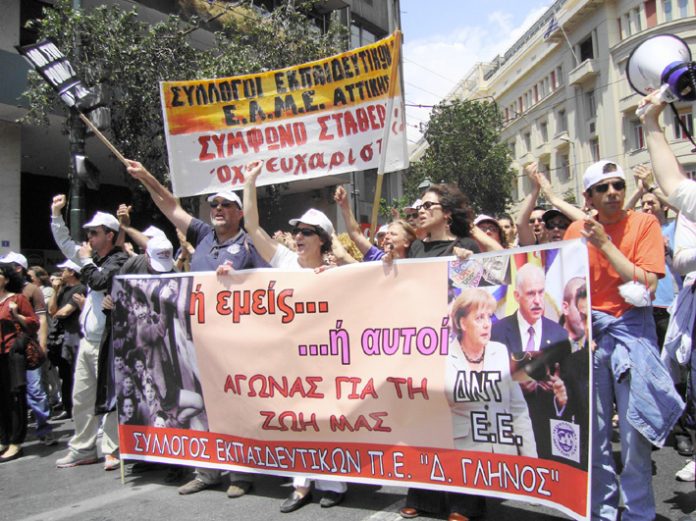
Trade unionists estimated that some 150,000 workers and youth participated in the two separate marches in Athens on Thursday.
The GSEE (Greek TUC) stated that millions of workers participated in the one-day general strike against the government’s Pensions Bill.
The PAME (Greek Communist Party trade union section) held a rally in central Athens and then marched to the Ministry for Labour which was occupied for a few hours.
The GSEE-organised march ended up outside the Vouli (Greek parliament).
Tens of thousands more took part in rallies and demonstrations in some 100 cities and towns throughout Greece.
Despite the very heavy riot police provocative presence next to the Athens demonstrations, no incidents of violence were reported.
The riot police tried to intimidate workers by setting up road blocks and searching peoples’ bags.
Some 100 people, mostly youths, have been arrested following a police raid in central Athens on a café popular with students and anti-state anarchist youths.
• The British TUC has expressed solidarity with the unions’ General Strike in Greece on Thursday.
The TUC statement said: ‘We believe that cutting back on public spending will reduce the growth that Greece needs to overcome its financial problems in the medium term, as well as increasing inequality and hurting the people least able to cope.
‘The TUC believes that a solution to the crisis in Greece and the wider EU can only be resolved through a pan-European drive to encourage economic growth.
/>
‘Imposing massive cuts to public services, public sector wages and pensions on a country in return for a bail-out that addresses only the symptoms of the crisis is a very unwelcome return to the policies that caused serious structural problems in the developing world during the 1980s and 1990s.
‘The cuts being proposed by the EU threaten to push Greece into years of recession which will not only cause enormous hardship but will also damage the health of the country’s public finances and hence further limit the capacity of the Greek Government to honour its debts.
‘The risk of such a spiral has already been one factor behind the market’s negative reaction to the bail-out package.
‘It is clear that the harshness of the cuts package is being driven by an xenophobic mood which claims the Greeks are getting their just desserts for a “Mediterranean lifestyle”.
‘Such ill-informed and prejudiced viewpoints should play no part in economic initiatives of such significance.
‘In fact, the Greek economy has made major productivity gains in recent years and Greeks work some of the longest hours in Europe.
‘Instead, it is vital that the EU as a whole identifies a programme designed to boost growth across Europe to allow economies to grow their way out this crisis.’
• MORE PICTURES SEE PHOTO GALLERY